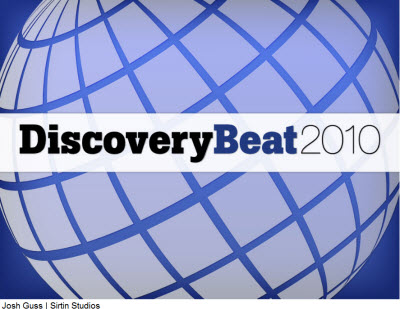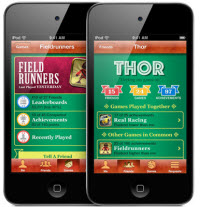 As app stores multiply and the number of publicly released apps — just the ones we can see and count — approaches 1 million, content developers are having a hard time standing out from the crowd.
As app stores multiply and the number of publicly released apps — just the ones we can see and count — approaches 1 million, content developers are having a hard time standing out from the crowd.
That process is known in the app world as discovery, and it’s getting harder with every new app, as developers fight for the attention of consumers and app-store managers.
“This is one of the key problems of our time,” said Savinay Berry, a vice president at Granite Ventures.
That’s why we’re tackling the subject of discovery at our second annual conference, DiscoveryBeat 2010, on October 18 in San Francisco. This year, the problem is only getting worse. The Apple App Store has more than 250,000 apps. There are new app stores coming or already in place from many other platform owners, from cell phone carriers to independent app catalogs.
Today, VentureBeat is showing off a bunch of the solutions aimed at solving the discovery dilemma. We call it the Discovery Directory.
 We have analogies for this kind of complexity. Online app discovery has gone rom searching through the shelves of a single store to trying to find something you like in a city full of shopping malls.
We have analogies for this kind of complexity. Online app discovery has gone rom searching through the shelves of a single store to trying to find something you like in a city full of shopping malls.
It’s not unlike the growth of the Web. Early on, when there were tens of thousands of websites, people wondered if there were too many. How would they ever find what they wanted? Along came Yahoo with its directory and then Google with the first truly effective search engine. They solved the problem and created the giant search industry.
But what will be the equivalent of search in the age of apps? If someone solves this problem, they will find a pot of gold, Berry said.
Some blockbuster apps are managing to rise to the top of the app stores without much seeming effort. For sure, good discovery starts with great content. Angry Birds, the cute iPhone app from Helsinki’s Rovio, sold nearly 7 million paid downloads on the App Store, spreading from Finland, then across Europe, to the U.S. It has held the No. 1 spot in the App Store longer than any other title — mostly because of word of mouth.
Rovio designed memorable characters that it can use across platforms and media — spreading to plush toys and possibly a cartoon movie. The product was designed to go across many platforms — Nokia trumpeted its availability in its Ovi app store — and can be easily updated with new levels to keep users coming back to the content.
But not all growth happens organically. Social-game firm Zynga reportedly uses a lot of its profits from virtual-goods sales to advertise its new games. Other developers aren’t rich enough to do that, so they have to figure out ways to give their apps a little push to get them across the tipping point so momentum can build.
The clever tricks and tips that we’ve heard about so far in our coverage of the app and game industries are myriad. They show that a little creativity goes a long way toward getting an audience for an app. Here are some of the tips and tricks that we’ve come across over time. I’ve put them in alphabetical order by the name of their provider.
 Apple Game Center This new feature of the latest version of the iPhone operating system, iOS, is like Xbox Live on the iPhone. It lets you socialize with other gamers, sharing games with them, competing in multiplayer play or posting your achievements and leaderboards for all to see. It helps you discover new games through friend referrals.
Apple Game Center This new feature of the latest version of the iPhone operating system, iOS, is like Xbox Live on the iPhone. It lets you socialize with other gamers, sharing games with them, competing in multiplayer play or posting your achievements and leaderboards for all to see. It helps you discover new games through friend referrals.
Applifier This app was born via a rebel alliance that felt big social game companies such as Zynga were becoming too dominant on Facebook. Zynga promotes its own games using a cross-promotion bar at the top of its games. Applifier duplicates this kind of cross-promotion bar, but across a bunch of third-party app developers who have joined Applifier. It has driven tens of millions of downloads.
AppLaunchPR How can you get noticed? Do some PR for your app, spreading it to review sites and pitching a story to big media. A good story is like free advertising.
Appolicious For both the iPhone and Android, Appolicious is a social networking service that makes recommendations based on apps that you own, finds and shares the best apps with your friends, and lets you become a top member by doing the best app reviews and lists of cool apps.
Appsfire This company has a full discovery platform composed of a site, an iPhone and iPad app, and a distributed infrastructure enabling users to search, share, monitor and find apps in a personal way. It generated over 4 million clicks on the App Store since launch and got to No. 2 ranking in the U.S. App Store.
AppStoreHQ This social network for app users lets you immediately see the most talked-about iPhone or Android apps on leading iPhone blogs. You can see app reviews, browse through all apps, and keep track of the latest via email.
Aurora Feint With its OpenFeint social game platform, Aurora Feint socialized the iPhone, building a community of gamers who can share games with friends. Developers who adopt OpenFeint can easily deploy leaderboards, cross promotions, achievements, friend invitations, and multiplayer games. Now it works for Android too.
 BackFlip Studios This Boulder, Colo.-based developer got started in April, 2009, making iPhone games. The company’s first title, Ragdoll Blaster, was a hit. But their second app, the free Paper Toss game, was downloaded millions of times and hit No. 1 on the App Store. Using AdMob, the company put ads for its paid games into the popular free app. That generated more downloads of BackFlip’s paid games. Those ads also generated more revenue from other developers, who bought ads that paid only when their apps were installed. Ad revenue became half of BackFlip’s revenue and it now has seen more than 45 million downloads of its iPhone games.
BackFlip Studios This Boulder, Colo.-based developer got started in April, 2009, making iPhone games. The company’s first title, Ragdoll Blaster, was a hit. But their second app, the free Paper Toss game, was downloaded millions of times and hit No. 1 on the App Store. Using AdMob, the company put ads for its paid games into the popular free app. That generated more downloads of BackFlip’s paid games. Those ads also generated more revenue from other developers, who bought ads that paid only when their apps were installed. Ad revenue became half of BackFlip’s revenue and it now has seen more than 45 million downloads of its iPhone games.
 Bolt Creative The two-man company that brought us Pocket God has seen more than 3 million paid downloads of its game, which debuted in January, 2009. The game was a viral hit, with users telling their friends to download it, partly because of its sick humor where you could feed native islanders to sharks. Bolt Creative kept it going by updating the game as often as it could; with each upgrade, Bolt changed the icon on the iPhone for the game, indicating to the user that there was an upgrade to download. The company’s fans have uploaded their favorite scenes to YouTube, and Bolt has encouraged fans to create a community around the game.
Bolt Creative The two-man company that brought us Pocket God has seen more than 3 million paid downloads of its game, which debuted in January, 2009. The game was a viral hit, with users telling their friends to download it, partly because of its sick humor where you could feed native islanders to sharks. Bolt Creative kept it going by updating the game as often as it could; with each upgrade, Bolt changed the icon on the iPhone for the game, indicating to the user that there was an upgrade to download. The company’s fans have uploaded their favorite scenes to YouTube, and Bolt has encouraged fans to create a community around the game.
Chomp Go to Chomp’s website and type in what you’re looking for. If you type “war strategy games,” Chomp will search through the App Store and come back with a couple of apps that fit the bill. It’s a search engine on top of the App Store and it works fast.
Disney–Tapulous Stick a known brand on it. Tapulous created its Tap Tap Revenge music rhythm game and sold tens of millions of units. It created specific versions for artists such as Dave Matthews or Lady Gaga. Fans of those specific celebrities paid to download the app and play rhythm games that were essentially like Guitar Hero on the iPhone. That’s why Disney bought Tapulous.
Facebook It may have killed off free viral marketing in social apps by stopping developers from spamming users with frivolous messages. But it is slowly opening new channels, such as its Game Dashboard, to highlight undiscovered apps.
Flurry Perfecting discovery starts with understanding users through analytics. Flurry’s analytics software is used by thousands of developers whose apps are being used by tens of millions of users. So Flurry knows what’s on the users’ phones. It has added AppCircle as a recommendation engine, analyzing the user’s taste in apps and then recommending apps that it thinks the user will like.
 GameStop This chain is an old-fashioned retailer with more than 6,000 stores. But it showed it understood how to drive traffic after it bought Kongregate, a site with indie games. Now GameStop is rolling out kiosks with access to online rewards accounts and free online games. It uses the foot traffic of 500 million people a year coming through its stores to drive the discovery of new content online.
GameStop This chain is an old-fashioned retailer with more than 6,000 stores. But it showed it understood how to drive traffic after it bought Kongregate, a site with indie games. Now GameStop is rolling out kiosks with access to online rewards accounts and free online games. It uses the foot traffic of 500 million people a year coming through its stores to drive the discovery of new content online.
GetJar Running the second-largest app store behind Apple has its benefits. The company makes money as game publishers pay extra to have their games highlighted on its site. So GetJar recently started an experiment where it will give away millions of copies of high-end mobile games from Glu Mobile. The promotion will last a couple of weeks and it is aimed at hooking more users on mobile games, leading to future purchases.
Google Search works great for websites. But will the giant come up with a way to search through apps on a variety of closed platforms? Perhaps that is what Google’s own social network will be for.
Heyzap If discovery is a huge problem, Heyzap can knock down some of the barriers by allowing web sites to embed games in their own sites through Heyzap’s widgets. They can also promote games with Heyzap’s social bar and other sharing features.
Hi5 This social network has just 50 million users. But it has figured out a way to challenge Facebook with its SocioPath social game platform. With it, Hi5 allows developers to adapt Facebook games to any platform. Then it allows gamers to share any game with their friends. Through a “contact importer,” Hi5 will let the gamer share that game with any friend, regardless of the platform they are using. Alex St. John, president of Hi5, says the aim is to liberate developers from Facebook.
iSwifter This initiative at the YouWeb incubator run by serial entrepreneur Peter Relan allows Flash games to run on the iPhone through its app. iSwifter will put a limited number of Flash games that are suitable for touch gaming into its app.
 Magic Solver This company has created a Daily Magic Cube app that shows you its favorite app of the day. You unwrap the mystery app as if you were untying a present. You can also use the cube to find new music or the best YouTube video of the day. It simplifies the process of discovery by creating an app that does the filtering for you.
Magic Solver This company has created a Daily Magic Cube app that shows you its favorite app of the day. You unwrap the mystery app as if you were untying a present. You can also use the cube to find new music or the best YouTube video of the day. It simplifies the process of discovery by creating an app that does the filtering for you.
Microsoft Xbox Live has been a great service for letting gamers discovery online games and other content on the Xbox 360. Now Microsoft is taking that to the cell phone with an Xbox Live hub on upcoming Windows Phone 7 devices. Those phones have hubs where Xbox Live users can access their account data. And while there are lots of web games accessible via browser, Microsoft can draw attention to the 60 or so launch games that are only on Xbox Live. Essentially, the Xbox Live hub on the Windows Phone 7 is a kind of curation service to weed out what gamers don’t want.
 Newtoy This McKinney, Texas-based company hit it big with Words With Friends, a Scrabble-like game on the iPhone. The game has sold millions of copies. To juice sales, the company created a free version for “Talk Like a Pirate Day” on September 19. The Words With Pirates game took off and captured a lot of press. That drove a lot of sales of the paid game.
Newtoy This McKinney, Texas-based company hit it big with Words With Friends, a Scrabble-like game on the iPhone. The game has sold millions of copies. To juice sales, the company created a free version for “Talk Like a Pirate Day” on September 19. The Words With Pirates game took off and captured a lot of press. That drove a lot of sales of the paid game.
Oberon Media The Blaze platform from Oberon allows game publishers to spread their social games outside of social networks, and leverage social to spread mobile and download games.
Oneforty This company makes a platform that sits on top of Twitter and makes it more useful. The site lists and categorizes apps that use Twitter, from business apps to location apps. Users can review the apps and vote them up or down. You can see who is using a Twitter app, see screen shots of it, and read the reviews.
PapayaMobile To get users to pay attention to Android games, PapayaMobile has launched Android App of the Day. The app is available for free or 99 cents for just a day. That should drive a search in interest for the app. Once it spreads, friends will want to pick it up and play. But by that time, they may have to pay full price.
Playmesh Charles Ju’s team of game developers has made more than 50 games on the iPhone. Titles such as iFarm have been big hits. But launching every new game can still be dicey. So Ju’s team pays $2,000 or so to have the game featured on FreeAppADay. Getting featured on that site leads to thousands of downloads in one day. That’s enough to get onto the App Store’s list of fastest-growing new apps. From there, the natural fun of the app is enough to keep it gaining momentum.
Qualcomm — With Vive, Qualcomm launched a free friends-based social recommendation service. You can use it to share apps with friends, regardless of what mobile device any given person is using. The effort headed by Kabir Kasargod lets you describe your mobile device. Then you can browse through friends’ apps. If you find an app you like, a link appears asking if you want to get it. The link will take you to the correct app store that has the app available for your phone.
RockYou With Deal of the Day, RockYou has found a way to monetize Facebook games beyond the normal amount. Lots of users pay free-to-play games on Facebook, but once they are asked to pay for something, most of them drop off. Deal of the Day is a special offer that lets a user accept an offer in lieu of paying for a virtual good in a game. Sometimes the user has to watch a video ad. Then they get the virtual good and can continue playing. RockYou has now expanded the deal to allow third-party developers to use it.
Scoreloop The Android Market for apps isn’t working so well. So Scoreloop is helping out phone companies by offering a white-label service that allows the carriers to build their own social hub on a phone, sort of like having a secondary market for apps that actually works. App developers create Scoreloop-based apps that can be cross-promoted on the hub. Taiwan’s Chungwha mobile carrier has signed up to use Scoreloop to create a social hub on its phones.
Siri Artificial intelligence can play a role in discovery. Research think tank SRI developed AI technology that could serve as a virtual assistant for humans. It spun the division off as Siri, which launched a free iPhone app in February. The voice-recognition app allows you to ask for something, such as a restaurant reservation, and Siri finds the place for you and makes the reservation. Much like a good location-based service, Siri can help you discover things you didn’t know were there.
 Smule Chief Technology Officer Ge Wang (pictured right) said his company starts with a device, the iPhone, and figures out how to design something unique for it. The team designed Ocarina, where you blow into the iPhone’s microphone and tap on its touch screen to make the sounds of the ancient flute-like wind instrument. It was a unique app when it debuted and Smule marketed it by creating YouTube videos of people playing it. Those videos spread by the millions, allowing users to discover magical apps.
Smule Chief Technology Officer Ge Wang (pictured right) said his company starts with a device, the iPhone, and figures out how to design something unique for it. The team designed Ocarina, where you blow into the iPhone’s microphone and tap on its touch screen to make the sounds of the ancient flute-like wind instrument. It was a unique app when it debuted and Smule marketed it by creating YouTube videos of people playing it. Those videos spread by the millions, allowing users to discover magical apps.
StumbleUpon This social network is aimed at discovery and it has launched a mobile app that will let users randomly find and rate new sites while they’re on the go. Users can use the app to discover fun stuff and then vote it up or down.
Tapjoy Started as an ad-network aggregator, Tapjoy lets you spread your mobile app across a number of platforms that reach more than 100 million users. It combines monetization, virtual goods platforms, ads, and offers to let developers make money and get broad distribution.
Ubisoft The French video game giant entered the Facebook game market last year with Tick Tock. The game got lost among thousands of apps and failed. Now it is trying a new tactic. It is launching companion games on both Facebook and the iPhone that riff on the company’s most famous brands. In the Assassin’s Creed Brotherhood game on the console, you can earn points that you can use in the Assassin’s Creed Project Legacy game on Facebook. You can unlock items in one game and spend them on virtual goods in the second game and visa versa.
WildTangent Through its BrandBoost ad platform, the company lets players opt to view an ad instead of paying for a game with a credit card. It thus broadens the audience that could discover a game.
This list is just a start. I’d like to add more examples, so please point them out in comments.
![]() Getting content noticed is a challenge for everyone making apps. Join us at DiscoveryBeat 2010 and hear secrets from top industry executives about how to break through and profit in the new cross-platform app ecosystem. From metrics to monetization, we’ll take an in-depth look at the best discovery strategies and why they’re working. The conference takes place on October 18th at the Mission Bay Conference Center in San Francisco. Sponsors can contact us at sponsors@venturebeat.com. To buy tickets, click here.
Getting content noticed is a challenge for everyone making apps. Join us at DiscoveryBeat 2010 and hear secrets from top industry executives about how to break through and profit in the new cross-platform app ecosystem. From metrics to monetization, we’ll take an in-depth look at the best discovery strategies and why they’re working. The conference takes place on October 18th at the Mission Bay Conference Center in San Francisco. Sponsors can contact us at sponsors@venturebeat.com. To buy tickets, click here.
VentureBeat's mission is to be a digital town square for technical decision-makers to gain knowledge about transformative enterprise technology and transact. Learn More
